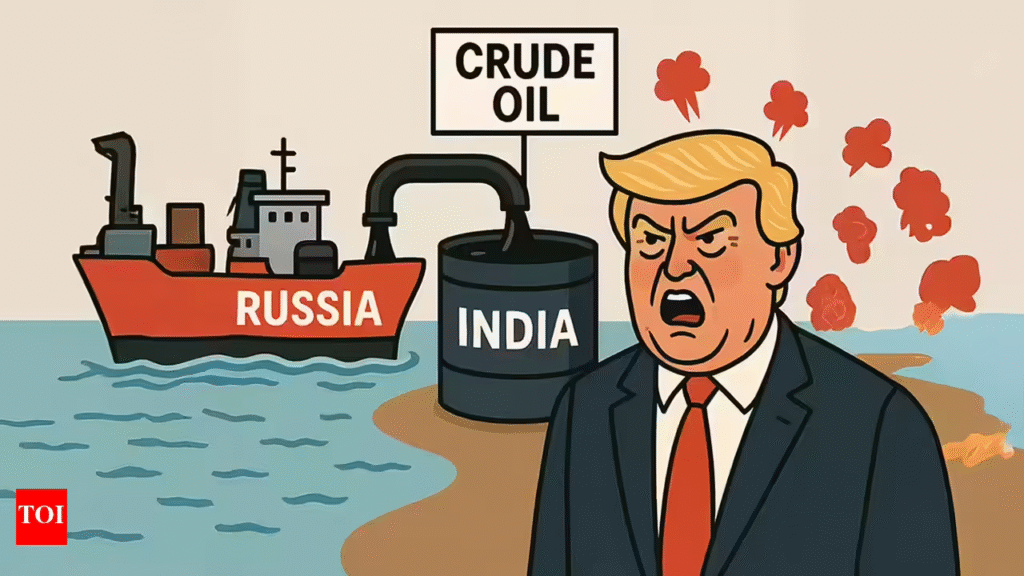Why is Trump threatening tariffs over India’s Russian oil imports? A deep dive into the India–Russia–U.S. trade conflict, updated August 2025.

Imagine two longtime partners locked in an unexpected standoff. That’s exactly the scene unfolding between the US and India—centering on India’s Russian oil imports and President Trump’s escalating tariffs. This blog delves into that friction, weaving in India Russia oil tariff conflict as the Primary Keyword, and unpacks why it matters for global commerce and geopolitics.
🇺🇸 Trump’s Tariff Trigger: Buying Russian Oil
In early August 2025, on August 4, former President Donald Trump took to Truth Social to accuse India of buying “massive amounts of Russian oil” and reselling it for profit. He warned Delhi it would face “substantially” higher tariffs, on top of an already announced 25% levy on Indian goods starting August 1 The Week+14US News+14India Today+14Moneycontrol+1. He insisted India was indifferent to Ukrainian casualties, calling the country complicit in financing what he termed Russia’s “war machine” New York Post.
His deputy chief of staff, Stephen Miller, backed the rhetoric on Fox News, calling India’s oil buying “astonishing” and framing it as morally and economically troubling for the war effort in Ukraine The Times of IndiaThe Guardian.
💡 Key takeaway
Trump used India’s Russian oil imports as justification for dramatic tariff escalation—both pre‑announced (25%) and hinted additional penalties linked to energy and defence purchases.
🛢️ Why India Still Buys Russian Oil

Historical Shift
Before 2022, Russian crude made up just 0.2% of India’s oil imports. Now it accounts for around 35–40% India Today+15India Today+15The Times of India+15. India turned to Russian crude heavily following global sanctions post-Ukraine invasion, thanks to discounted pricing and market stability.
India’s Defence of Policy
MEA spokesperson Randhir Jaiswal stressed that India began importing from Russia when Western markets pulled out—energy choices are driven by global pricing and national interest, not geopolitics Hindustan Times+1. Commerce minister Piyush Goyal echoed this, asserting India’s rise as the world’s fastest-growing major economy demands independent decision-making MoneycontrolThe Times of India.
💡 Key takeaway
For India, Russian oil imports are an economic necessity rooted in global market dynamics, not political alignment.
🌍 Russia’s Response: “Neocolonial” U.S. Policy?
Russian Foreign Ministry spokesperson Maria Zakharova accused the U.S. of neocolonial behavior—imposing politically-motivated economic pressure that violates sovereignty and free trade principles streetinsider.com+2uk.news.yahoo.com+2. She emphasized that over time, countries across the Global South and BRICS nations increasingly support Russia in resisting U.S. economic coercion uk.news.yahoo.comecfr.eu.
Zakharova warned tariffs threaten both the U.S. and global economy by fragmenting trade and disrupting supply chains uk.news.yahoo.com.
💡 Key takeaway
Russia frames Trump’s tariff policy as part of a broader attempt to suppress multipolarity and enforce economic dominance under the guise of war sanctions.
🇮🇳 India’s Tough Balancing Act

Analysts argue that Trump’s posture has damaged trust. After Trump praised/P later criticized both Modi and Russia, New Delhi now faces pressure from Washington just as it deepens ties with Moscow The Guardian.
China and Turkey, also major Russian energy buyers, have not faced similar threats—raising concerns of double standards in U.S. policy toward countries of the Global South The Guardian.
Strategic thinkers such as Shyam Saran and Pratap Bhanu Mehta warn India should not yield to U.S. demands at the expense of national sovereignty, even if pushing back comes with short-term economic consequences The Guardian.
💡 Key takeaway
India is navigating a diplomatic tightrope: maintain autonomy in foreign policy while minimizing economic fallout from strained U.S. relations.
🔍 What’s Next?
- Will India change energy sourcing? Trump claimed he “heard” India may stop buying Russian oil, though officials quickly denied any policy shift The GuardianThe Week+2Hindustan Times+2.
- Will India‑U.S. trade talks stall? With FTAs in negotiation, these aggressive positions may slow progress.
- Will the U.S. apply similar pressure to China or others? India’s excluded peer group begs the question of selective policy consistency.
✅ Summary Table
| Issue | U.S. Position | India’s Response | Russia’s Frame |
| Russian oil imports | Profit-driven, enabling war | Economic necessity, market-driven decision | Example of U.S. economic coercion |
| Tariffs & penalties | 25% + additional charges | Unjustified targeting, violation of norms | Risk to global stability and supply chains |
| Sovereignty & diplomacy | Demand alignment with U.S. objectives | Defense of independent foreign policy | U.S. pursuing a neocolonial agenda |
📣 Call to Action
What do you think India’s strategic default should be? Continue realpolitik-driven ties with Russia or recalibrate energy sources to appease global partners? Share your take below and let’s discuss India–Russia–U.S. geopolitics.

Leave a Reply